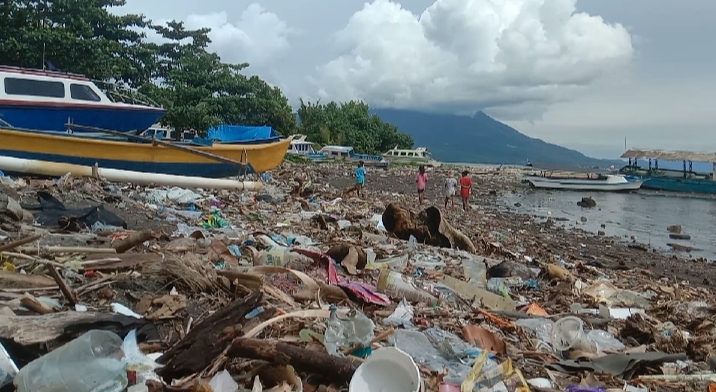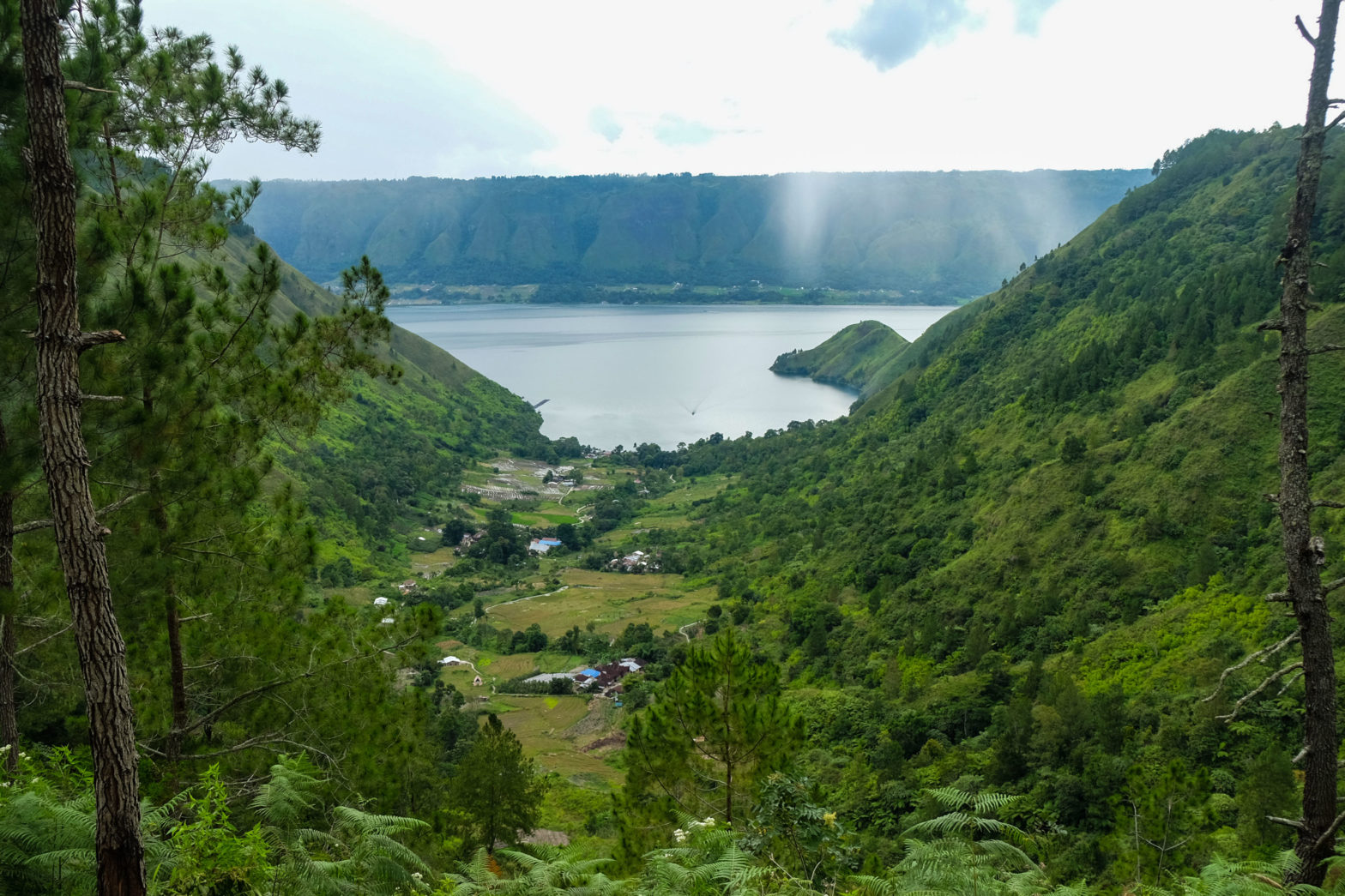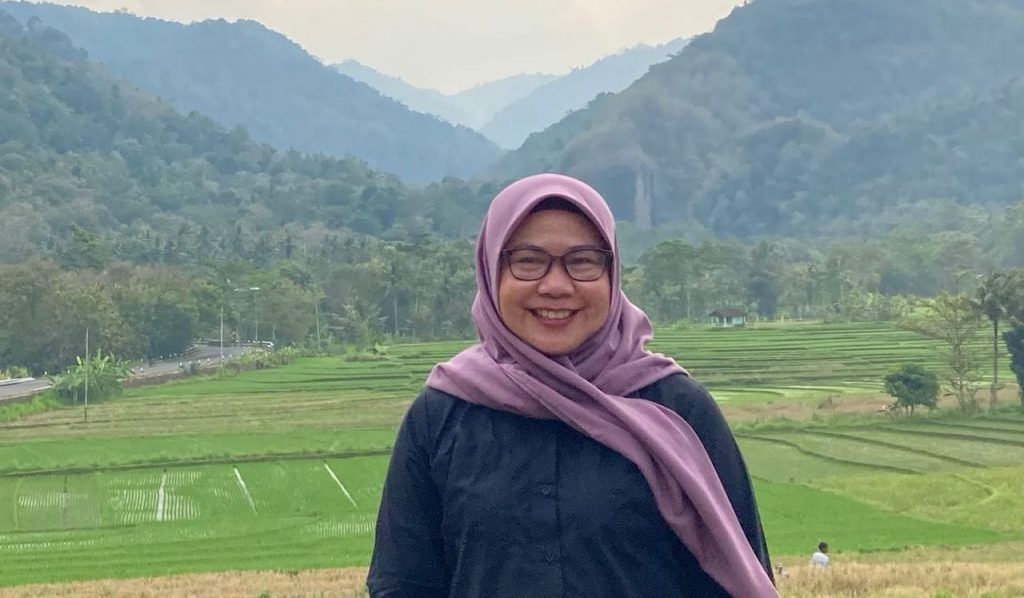Twelve-year-old Alya Mukaram, was playing with her friends on the shores of Ternate City’s Gambesi urban ward that late afternoon in mid September 2021. The seventh grader and her friends Rara, Melati, Riska, Arfa, and Mawar were gathering plastic jars, containers, spoons and forks, and other plastic objects they can use to play with at the beach.
Alya said that the shore was her favorite playground after school hours where she can salvage items they can use as toys.
“Playing here is easy, it is not difficult to find toys. We just have to come and we will find them,” Alya said with glee.
Ali, a resident of Gambesi, said that the garbage that covers the beach in the area actually came from the mountain, brought down to the shores by heavy rains through dry river gullies, known locally as barangkas.
Waste also comes from the Sasa and Jambula urban wards of Ternate island, carried by the sea current to the shores of Gambesi.
“The amount of waste piling up here is not normal, maybe because there has been a lot of rain in the past few days and also the currents are strong so that the waste at the bottom of the sea are being washed ashore,” said Ali on that same afternoon.
The 54-year-old resident said that the waste not only dirties the sea and the shores but also threatens the local marine ecosystem.
“When waste comes down through the barangkas and reaches the sea, we are the ones who will feel the impact, what’s more, in this area, we have sea grass and fishes that we consume.”
Ali, Gambesi Urbanward
Ali said that the waste began to noticeably pile up in this shore in 2013, but at the time it only happened during the rainy seasons. In the dry seasons the waste is less visible and often was quickly washed away by the tide.
Plastic waste makes up the majority of the waste that piles up in the rainy season. Plastic straws, plastic and glass bottles, tins, instant noodle packages, old containers, diapers, and other plastic material pile up on the shores.
They mostly came from household waste from higher grounds that are just dumped into the barangkas and drainage canals, and end up in the sea. Data from the Ternate City Disaster Mitigation Agency showed that there are 31 barangkas across the city that leads to the sea.
Observation at the beaches in Bationg and Gambesi subdistricts in mid September 2021 found piles of waste covering the entire coast and the sea in the area.
Impacts of waste on phytoplankton
Ridwan Lesi, a lecturer at the Fishery and Maritime Sciences of the Khairun University in Ternate City said that plastic waste in a real threat to the marine ecosystem. The plastic waste contain inorganic material that breaks down into microplastic — tiny fragments of plastics of less than five millimeters in length. He said that microplastic are much smaller than the diameter of a human hair.
“The size of microplastic are really small, so that that plankton thinks these microplastics are food and once inside them, these would then get into the food chain, first eaten by plankton, they eaten by fish and finally into human bodies,” Ridwan said at his faculty on September 21, 2021.
According to the Ministry of Environment and Forestry, phytoplankton is a type of organism that is also known as microalgae. Phytoplankton produce about 50 to 85 percent of the oxygen on earth every year while other land plants only produce about 20 percent.
Ridwan said that the phytoplankton population in the sea off Ternate City is still healthy but if nothing is being done to the current volume of plastic waste in its waters, he believes that phytoplankton would cease to exist in 20 to 30 years.
A research by the Scripps Institution of Oceanography of the University of California San Diego cited by researcher from University of Indonesia, Arjuna Putra Aldino found that the presence of plastic waste in the sea can affect the sea’s natural carbon equilibrium. If nothing is done to overcome the problem of plastic waste, which later would break down into microplastic, then the sea’s function as a biological carbon storehouse could cease.
Plastic waste differs from other waste that could decompose such as food waste, leaves and tree branches that could provide food for the phytoplankton. Plastic waste in fact, inhibits the growth of the phytoplankton.
“The presence of plastic waves reduces the population of phytoplankton. This is because plastic wastes obstruct the sun rays, needed for its development,” said Yuliana, who researches phytoplankton in the sea off Ternate City.
Speaking on September 27, 2021, the lecturer at the Faculty of Fishery and Maritime Sciences of the Khairun university in Ternate explained that like plants on land, phytoplankton have chlorophyll that captures sun rays and convert them into chemical compounds through photosynthesis. It actively acts as a main producer of oxygen but its growth depends on the availability of carbon dioxide, sun, and nutrition.
“If plastic waste continues to remain in the sea, phytoplankton would be threatened and clearly would decrease in number. There is at least a need to educate the public so that they do not turn the seas as their final waste dumping ground, teach them about the impacts of waste that ends up in the seas, or the Ternate City administration should provide a plastic recycling facility, to reduce plastic waste,” Yuliana said.
Limited waste processing facility
The Ternate City Environment Office said that the amount of waste dumped to the city’s final landfill now reaches between 70 and 80 tons per day. And this amount still excludes the waste in the sea and up until now no data on marine waste is available.
Data from the National Waste Processing Information System (SIPSN) of the Ministry of Environment and Forestry showed that in 2020 there were 5.67 million tons of plastic waste in Indonesia, or 17.12 percent of the total amount of waste that reached 33,113,277.69 ton.
In Ternate City, plastic waste accounted for 12.5 percent of the city’s total annual waste that reached 26,384.69 tons .
Tonny Sachruddin Pontoh, who heads the Ternate City Environment Office said that the city’s volume of waste will continue to rise in line with the population growth.
A 2020 demographic census held by the North Maluku Province Bureau of Statistics showed that Ternate City’s population stood at 205,000, a bit less than the previous year, but the amount of waste produced continued to increase while the capacity of the city landfills and the number of waste trucks are limited.
Tonny said there are 107 landfills spread in subdistricts across the city; 12 in North Ternate, 32 in Centra Ternate, 48 in South Ternate and 15 in Ternate Island.
In 2022 his office will receive a plastic waste shredder, garbage containers, garbage trucks from the district Special Allocation Funds. His office will also turn five landfills into integrated waste processing facilities in Bastiong, Talangame, Takoma, Dufa-dufa, Santiong, Tubo and Kalumata urban wards.
Tonny admitted with the absence of sea waste carriers, his office has not been able to handle the waste in the sea off Ternate City. On land, there are only 17 garbage trucks, each of them more than 10 years old.
“At most, we will need four long boats to deal with garbage in the sea. Ifwe have them, there may no longer be a problem. We can start to handle waste step by step,” Tonny said.
He added that to prevent garbage from flowing into the sea when there’s heavy downpour, nets are being installed in each barangkas.
Tonny also emphasized on the importance of awareness and sense of responsibility among residents in overcoming waste issues, both in urban ward and subdistrict levels.
“Each urban ward and sub-district need to carry out their own sensitization program, to educate the public that garbage is not only the responsibility of the Ternate City Environment Office, but all of us,” Tonny said.
Single-use plastic
Executive Director of North Maluku’s chapter of the Indonesian Forum for Environment (WALHI) Ahmad Rusyadi Rasjid, said that the Ternate municipal administration plays an important role in handling its waste problem, and having a policy that limits the use of plastic products is a must.
“We are currently campaigning against single-use plastic bags but we continue to see piles of plastic waste everywhere, on land or in the sea. So, the producers of plastic products must be restricted otherwise we will never be able to handle this plastic waste problem,” Ahmad said on September 27, 2021.
He said that the campaign against single-use plastic and environmental education that were targeting school children and the youth in 2019 were aimed to make them understand about the threats of plastic waste. However the North Maluku WALHI were only able to conduct these programs twice before the Covid-19 pandemic was announced in March 2020.
“Thank God I think these activities have helped in building awareness and following each session we collected plastic waste to recycle or create a plastic-based product. So, at the very least we hope this small step can lead to bigger strides in reducing plastic waste,” he said.
The management of plastic waste was actually already touched in a Regulation of the City Of Ternate number one of 2013 on Waste Management which prohibits the dumping of garbage in a number of locations. The prohibition carries up to three months in jail or a fine of up to Rp50 million for violations.
Meanwhile, Presidential Regulation Number 83 of 2018 on the Handling of Waste in the Sea is more specific, targeting a reduction of plastic waste in the sea by up to 70 percent by 2025.
But the low level of public concerns on the issue of garbage constituted a weakness in the management of waste, Ridwan said. Waste management needs to first overcome garbage issues on land before handling the issue of garbage in the sea.
He said that phytoplankton played a very important role in climate change because it is capable of absorbing carbon from the atmosphere and thus reduce carbon emissions.
“I there is much plastic waste in the sea, there will be no photosynthesis and carbon dioxide would not be absorbed well and therefore the phytoplankton would die and thus the amount of carbon that would rise to the surface of the sea will contribute to climate change,” he said.
Regulating use of plastic
M. Tauhid Soleman, the Mayor of Ternate, said that to prevent the extinction of phytoplankton population in the sea off Ternate due to plastic waste, his administration plans to issue a mayoral regulation that will restrict the use of plastic products, targeting large retailers and shopping areas.
“We will also regulate plastic bags the public use when shopping, they should no longer use plastic bags but must bring their own shopping bags that can last a long time and are not made of plastic,” said Tauhid on September 30, 2021.
He said that the management of plastic waste will involve the private sector and state-owned enterprises through their Corporate Social Responsibility schemes, including the provision of 32 three-wheeled garbage pickup trucks to be deployed in each urban wards of Ternate and three longboats to tackle waste in the sea and along the coasts of the sub-districts of South, Central and North Ternate.
Ternate is one of the Indonesian cities included in the Climate Resilient & Inclusive Cities (CRIC) program for the 2021-2025 period. The CRIC program is a project of the United Cities and Local Governments Asia Pacific (UCLG-ASPAC) funded by the European Union for Southeast Asia, South Asia and Europe.
This program serves as a platform for proposing unique and sustainable cooperation between cities and research centers in Europe, and other countries in Southeast Asia, as well as contributing to sustainable and integrated urban development, good governance, and climate adaptation and mitigation.
Through the program facilitated by the Association of Asia Pacific City Administrations, Tauhid said the city of Ternate is committed to tackling its waste issues by continuous education and the development of policies that would encourage healthy public behavior.
“The role of housewives is also very important because they are at the forefront of the family empowerment and welfare movement (PKK) at the urban ward and sub-district levels, and can encourage the community to live a clean life by involving all elements of the society. In principle, the garbage issue needs to be seriously handled so that the public is aware of the environment, and that the coast is not a landfill.”
M. Tauhid Soleman, Ternate Mayor
He said that waste management is part of the city’s five-year vision aimed at attaining a healthy environment through climate change mitigation and adaptation actions.
This story is par of the “Environmental Story Grant” program organised in partnership by Ekuatorial and the Society of Indonesian Environmental Journalists (SIEJ), and was first published in Indonesian by Haliyora.id on 29 October 2021.


